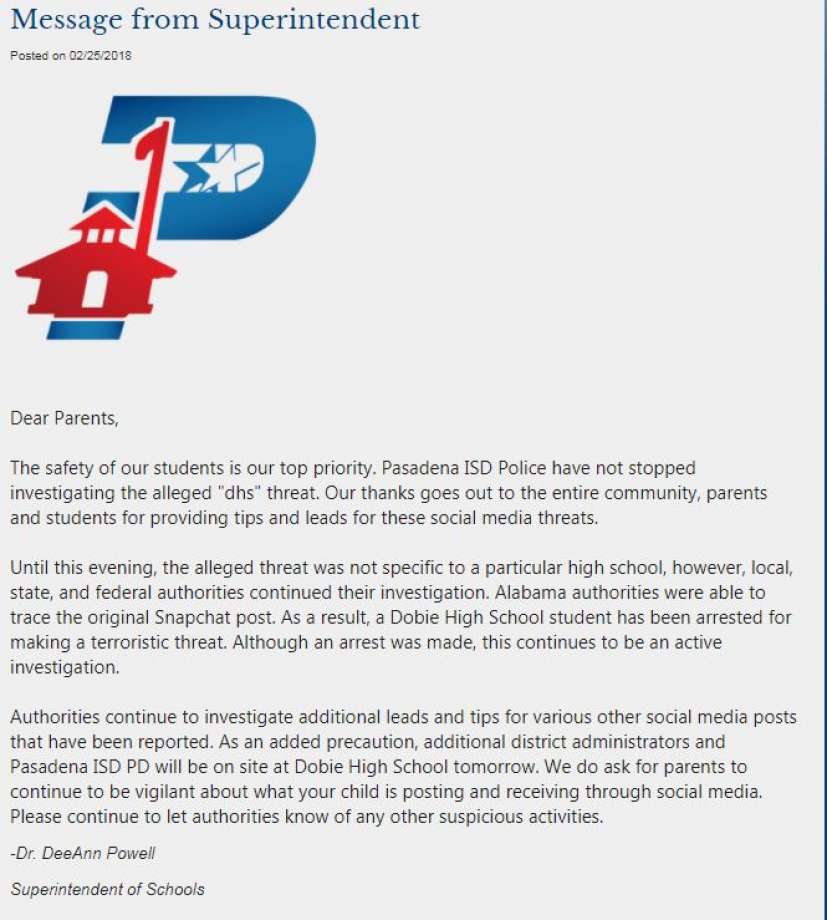The Police Department in Foley, Alabama refuses to release statistical data showing the number of black people that they arrest every year.
Independent Press Journal (IPJ) has spent weeks trying to obtain statistical records from Foley’s Police Department (PD). Specifically, investigators requested the number of people arrested by their department in the last 10-years, segmented by race.
However, when Foley PD’s “Custodian of Records,” Chuck Sutherlin, was asked for those numbers, he flat-out refused.
A SIMPLE RECORDS REQUEST
Foley PD’s Records Department is called the “Criminal Intelligence Unit” (CIU). According to Foley PD’s 2017 annual report, the overall mission of the CIU is “to collect, compile, and store criminal reports and data and to perform crime analysis for the department.”
Like most Police Departments, Foley PD requires a “record request” in order to obtain any type of police record.
On September 17, IPJ placed a standard record request with Foley PD, specifically seeking the number of people arrested in the last 10-years, segmented by race.
Missy Gibson, Records Manager at Foley PD, told investigators that arrest records have been digitized since at least 2005, and that their current records database has the capability of retrieving statistical records.
Joe Wiseman, a Crime Analyst Technician in Foley PD’s CIU, whose job duties include “providing crime data and crime statistics to the CIU sergeant for analysis,” also confirmed with investigators that arrest records have been digitized since at least 2005.
When asked if Foley PD’s systems could produce numerical arrest data segmented by race, Wiseman responded: “Of course, it’s a standard structured SQL database, sure.”
Wiseman explained that it is “not difficult” to retrieve statistical arrest data, such as the number of black people arrested in any given year, reiterating, “all that stuff is producible.”
However, once the record request reached Sergeant Chuck Sutherlin – Wiseman’s boss and the Custodian of Records at Foley PD – the record request was promptly blocked and obstructed.
TAKING AN INFO-DUMP

Sutherlin suggests that the only way for the public to find out how many black people Foley PD arrests in any given year is to purchase every single individual arrest sheet, for every single person arrested, for every single year, and to manually separate the black people from the white people, then to count them individually:
“[Foley PD is] under no obligation to collate the information in any manner for public inspection as you requested. Should you decide to inspect the information and duplicate it at your expense, please know that the information fits on 525 pages and our duplication fees are $1 per page.”
Sutherlin’s suggested “info-dump” appears to be an attempt to obstruct the record request made by IPJ, and to prevent investigators from obtaining conclusive arrest data in Foley PD’s jurisdiction.
According to Katherine Gallo, an expert in legal discovery, an “info-dump” is when someone “attempts to discourage [record] inspection by producing a truck loaded with files. When you protest that these go far beyond your demand, [they claim], “Sorry, but this is the way [we keep] files…”
Gallo’s definition of “info-dumping” accurately describes the actions of Sutherlin and the Foley PD as it relates to the request for black arrest data from their department.
In fact, in civil cases, it’s a sanctionable offense to intentionally obstruct record requests (discovery) through the means of info-dumping.
UN-REASONABLE COSTS
Sutherlin claims that $525 is a reasonable cost to obtain data that takes minutes to retrieve, and fits onto a single page.
In Sutherlin’s reply to investigators, he cited the Open Records Act, which states that “a public entity may recoup reasonable costs incurred in providing public documents, including staff research, preparation, and time.”
However, Wiseman and Gibson – both Records Department employees – confirmed that the statistical records were produceable, and that they existed within Foley PD’s records database. Wiseman even agreed that it would probably only take a few minutes to retrieve using a database search query, and that it could likely fit onto a single page.
When IPJ reminded Sutherlin that – according to record department employees – Foley PD could easily query numerical arrest data without the need to print hundreds of pages to manually sift-through, Sutherlin responded that he is “completely aware of those [record database] capabilities.”
“There is no requirement for public agencies to compile information or tailor a data set for the public,” Sutherlin told IPJ.
UN-REASONABLE LIMITATIONS:
According to Sutherlin: “The custodian of the records has the authority to regulate the manner in which records are inspected and to set reasonable limitations upon access to records to preserve the integrity of the records, minimize the expenses, and prohibit work disruption.”
Sutherlin did not clarify how concealing the number of black people arrested by Foley PD could possibly be considered a “reasonable limitation.”
Similarly, Sutherlin did not explain how printing 525 pages helps to “preserve the integrity of the records, minimize the expenses, and prohibit work disruption.” In fact, Sutherlin’s justifications directly contradict his own statements, and are not supported by his claims:
“INTEGRITY OF THE RECORDS”
Printing 525 pages would have the effect of releasing personally identifiable information that IPJ did not ask for in the original record request, such as individual arrest sheets of every person arrested. It is unclear how printing hundreds of (unrequested) arrest sheets would be aimed at “preserving the integrity” of public records.
“MINIMIZING EXPENSES”
There is a clear difference between the cost of 1 page of numerical data, and the cost of 525 pages of arrest sheets. To put it into perspective: 525 printed pages is more than an entire ream of paper that goes into most printers, amounting to a stack of pages almost 6 inches in height. It is unclear how printing 525 pages would be aimed at “minimizing expenses” – it appears that it would have the opposite effect.
“PROHIBITING WORK DISRUPTION”
Printing 525 pages would conceivably require more paper and more human resources than producing a single page. Sutherlin’s own employees confirm that it’s “easy” to produce the statistical data requested. Therefore, Sutherlin’s assertions do not appear to be related to preventing “work disruption” either. On the contrary, the printing of 525 pages, as Sutherlin suggests, would likely cause a “work disruption.”
Sutherlin’s actions of limiting access to public records do not appear reasonable, nor are those limitations supported by his claims of needing to do so in order to “preserve records, limit costs, or reduce work disruption.”
At one point, Sutherlin tried to deflect the record request all-together by directing investigators to third-party websites that do not contain the data that IPJ requested: Number of arrests, segmented by race.

When an investigator pointed out that the information contained within the third-party websites does not fulfill the records request made by IPJ, Sutherlin replied, “You have received our answer which has been reviewed and approved through the Chief of Staff at every step.”
IPJ attempted to contact the Chief of Staff, Thurston Bullock, who is also Foley PD’s Deputy Chief.
Bullock did not respond.
FOLEY PD VIOLATING THE LAW?
According to Alabama § 36-12-40: “Every citizen has a right to inspect and take a copy of any public writing of this state.”
There are very limited exceptions to this law. When the law has been challenged, Alabama Courts have consistently sided with the public.
In his response to IPJ, Sutherlin cited the court case: Blankenship v. City of Hoover.
However, upon reviewing that court case, it is immediately evident that the court sided with the public, calling for a “limited” application of exclusions, and for the non-disclosing party to bear the burden of proving why the information is non-disclosable.
According to Blankenship v. City of Hoover, the courts found that:
“Sections 36-12-40 et seq. are to be liberally construed in favor of the public. However, … there are some exceptions to, or limitations on, the application of these statutes, although the exceptions or limitations must be narrowly applied.”
The court further explained:
“Exceptions should not come into play merely because of some perceived necessity on the part of a public official or established office policy. Furthermore, because there is a presumption of required disclosure, the party refusing disclosure shall have the burden of proving that the writings or records sought are within an exception and warrant nondisclosure of them.”
Therefore, the burden of proof rests on Foley PD to prove that they have an exception that warrants non-disclosure of any records requested. According to Gibson and Wiseman – both of whom work in Foley PD’s Records Department, the database records exist, and that they were not difficult to retrieve.
Sutherlin claims that the non-disclosure of arrest data is related to “preserving the integrity of the records, minimizing the expenses, and prohibiting work disruption.” However, those excuses are not applicable to the arrest data record request made by IPJ. Furthermore, Sutherlin’s statements are repeatedly and directly contradicted by Records Department employees, one of whom stated that the number of black people arrested in any given year is a “producible” statistic that is “not difficult” to retrieve.
Foley PD fails to provide reasonable or valid reasons for non-disclosure of the requested records, and therefore, appears to be in violation of Alabama § 36-12-40, as well as the legal precedent set forth in Blankenship v. City of Hoover.

Investigators attempted to reach Sutherlin’s direct superior, Lt. Tony Fuqua, but he did not respond to IPJ’s inquiries. Similarly, Foley Police Chief, David Wilson, has dodged contact by IPJ investigators for weeks, ignoring numerous messages, phone calls and emails.
OTHER POLICE DEPARTMENTS ARE MORE TRANSPARENT
IPJ has made the exact same records request to at least a dozen police departments in Alabama, including numerous police departments in Baldwin County, such as those in Daphne, Spanish Fort, and Fairhope. In all these cases, IPJ’s record requests were fulfilled within days, and in most cases, the records were provided via email, and for free. The longest IPJ investigators have waited for numerical arrest data from a police department is 5 days, and the most a police department has charged for those records was $2.
In contrast, Foley PD outright refuses to provide statistical data, uses info-dumping tactics to prevent reasonable access to information, and attempts to charge exorbitant fees, all of which has the effect of deterring the public from obtaining records in the first place.
RESIDENTS OF FOLEY REACT
IPJ has spoken to numerous current and former residents of Foley, including a former Foley PD employee, none of whom wish to be identified out of fear of retaliation.
A former resident told IPJ that he and his family left town because he was being racially profiled and treated unfairly by police. The resident described his interactions with Foley PD as a “shakedown,” adding, “I’m pretty sure they just pull-over every black person that they see driving by and try to arrest them for whatever they can.”
A current resident of Foley told IPJ: “It’s well known that Foley Police is racist and corrupt. It doesn’t surprise me at all that they don’t want anyone knowing how many black people they arrest here.”
A former employee of Foley PD places responsibility squarely on the leadership within the police department, telling IPJ: “Racism within Foley‘s police department is a serious problem that starts at the top. It happens within the department, so of course officers are racially profiling people on the street too. The fact that they’re hiding the number of black arrests tells you everything you need to know about Foley’s police department.”
The President of the Baldwin County NAACP, Alec Barnett Jr., told IPJ that without transparency from law enforcement, it would be impossible to determine if abuses and racial profiling was happening. “I’d like to see Foley Police Department produce those records. If other police departments can do it, then Foley should be able to do it too.”
Barnett explained that this type of secretive behavior related to the arrest of black people reinforces the concerns and distrust that many people in his community already have towards law enforcement.
“The longer Foley Police refuses to release the data, the more it looks like they’re hiding something, and the worse it looks for them. They’re making themselves look bad.”
In the last 12-months, IPJ has conducted in-depth studies on the arrest rates of black residents in various cities within Baldwin County, Alabama. Police Departments in the cities of Daphne, Spanish Fort and Fairhope have all fully cooperated with record requests, and providing statistical arrest data, segmented by race. In contrast, Foley’s Police Department continuously (and suspiciously) refuses to cooperate with the same requests.
The extent at which Foley PD is concealing information from the public – and the reasons why they are doing so – are still unclear.
One thing however, is very clear: The Foley Police Department does not want you to know how many black people they arrest.
Update: 10/09/2018 — Four days after the publication of this article and it’s widespread dissemination on social media, Foley PD contacted IPJ to provide the arrest data originally requested in the document request. The arrest data was provided on a (2) page digital PDF file, without any printing costs. In the near future, IPJ will follow-up on this story by publishing the numerical data and analysis regarding the arrest rates from the data provided by Foley PD.
Since you’re here . . .
Independent Press Journal (IPJ) is a 100% volunteer project that relies on the support of our readers to keep going. In today’s world of special interests and big-money influence, it’s getting harder and harder to find truly independent reporting. That’s why it is more important than ever to support independent journalists who will report the stories that major news outlets won’t.
If everyone who reads and appreciates our reporting becomes an IPJ supporter, our team could dive even deeper into investigations, and report on even more stories that matter.
If you enjoy reading our exclusive, investigative stories, then we invite you to become an IPJ supporter!
For as little as $1, you can become an IPJ supporter – and it only takes a minute.
Please show your support! Thank you.
– Team IPJ
















![EXPOSED: The Anti-Government, Government teacher [PowerPoint Slides]](https://independentpressjournal.com/wp-content/uploads/2017/07/gov-t-1-46-jpg-e1501394930153.jpg)
![RACISM EXPOSED: “Where are my white-male federal privileges?” asks Alabama teacher [PowerPoint Slides]](https://independentpressjournal.com/wp-content/uploads/2017/07/gov-t-1-53-jpg-e1501395052799.jpg)
![Multiple students in Alabama post racist songs online [Offensive Content]](https://independentpressjournal.com/wp-content/uploads/2017/11/Screen-Shot-2017-11-02-at-6.49.07-PM-1.png)